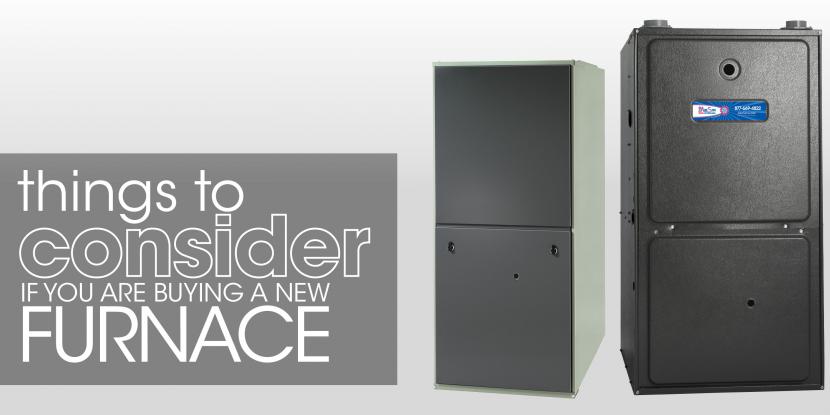Things to Consider When Buying a New Furnace

Things to Consider When Buying a New Furnace
- By - Irma Willis
- Blog
- June 9, 2020
- 0

Things to Consider When Buying a New Furnace
Replacing your worn-out or old furnace with a new and more efficient one can help save a lot in utility bills. Other than money, however, the current heating solutions have little to no emissions and make rooms comfier by providing heat more consistently than the older iterations.
We have years of experience installing, repairing, and maintaining furnaces. We cannot help sharing the knowledge we have garnered when it comes to buying a new furnace.
Two Key Factors For Consideration When Buying a New Furnace
The Size
Your potential new furnace’s specs should match your requirements. If you have a moderately big house and get a small unit, your house will be nowhere near comfortable during the cold season. To avoid this issue, most furnaces tend to be bigger than necessary. This, of course, will cost you more, making the initial price a potential drawback.
A furnace that is too big for your space will cycle on and off more regularly, which puts more wear on the components and wastes energy. It can also lead to wide temperature variances, which leads to discomfort. Also, a bigger unit may call for larger ducts as inappropriately sized ducts can cause noisy airflow.
To ensure appropriate sizing and ideal installation, pick a competent HVAC or heating contractor as they will take time to figure out your heating needs in accordance with industry standards such as the Manual J HVAC Load Calculation provided by the Air Conditioning Contractors of America. These calculations are fairly accurate as they put things like construction, design, and size of your home in addition to the climate into consideration.
Once your replacement unit is operational, ensure you maintain it in accordance with the manufacturer’s recommendations. Human error or ignorance, improper installation, and inadequate maintenance are the common causes of service calls.
Efficiency is Vital
Gas is the most common source of fuel, and most heating systems utilize it. How efficient a unit is shown by the annual fuel utilization efficiency rating or AFUE, which is represented in percentage form. The higher the value, the more heat the furnace can generate from gas, without wastage. Given that efficient heating units have fewer emissions, factors like carbon footprint or environmental conditions might influence your decision.
Furnaces have really advanced over the years, becoming more and more efficient. Heating units manufactured in the early ’70s used to have an efficiency rating of around 65%. Nowadays, the lowest efficiency percentage allowed by regulatory bodies for new heating units is 78%. Some models today have an AFUE rating of 97%, which is very appealing if you are after an almost completely efficient unit.
The furnace price tends to rise as the efficiency rating increases. So, do not be surprised to find a 95% AFUE furnace costing more than its 80% AFUE counterpart. However, do not be afraid of the initial investment as it is almost certain you will recoup the money over the years, thanks to lower fuel consumption. This is especially a huge benefit in areas that are notorious for cold weather. However, how much you recoup from your investment depends on more than just the efficiency rating. The power needed to run a furnace, or any heating unit can vary dramatically. How well your house is insulated, the local electricity and gas rates, as well as your location’s climate, can also affect the payback time.
When doing your homework, as your contractor to give you a range of efficiencies and figure out the yearly estimated running cost of each potential unit, rather than doing estimations. These calculations are easy to do as all the contractor needs is to plug in the AFUE, local utility rates, electrical consumption, and your home’s features into one of the many reliable programs designed for this purpose. Ensure that all quotes include the cost of any changes to venting required by any appliance in your home.
Some other important questions to ask the heating specialist include:
-Is the unit relatively new? Introduced at least 2 years ago and thus untested?
-Are there any reliability issues if the model is older?
There are many ways to make your home more energy efficient. Turning down the thermostat just a notch during winter can save you a substantial amount of money on energy bills and minimize emissions by as much as 6%. Turning down the thermostat by 2 degrees at night does not take a toll on your comfort, but really saves you a lot. Also, consider getting a programable thermostat for proper tuning in cases where you are not at home.
Another way to make your home more energy efficient is by drawing the curtains to block the night chills and uncover them during the sunny days in winter to enjoy some natural heating. Also, insulate the ducts and seal leaks to alleviate heat loss.
Repair Vs. Replacement
There are a few things you can do to avoid calling a professional when your furnace malfunctions:
-If you are experiencing poor airflow, check whether the air filter on your unit is clogged.
-Check whether the thermostat is malfunctioning. Checking and changing the batteries on the unit might be all you need to fix the issue.
-Has the circuit breaker tripped? This might be a sign of power issues or burnt fuses.
If none of the above works, you have no option but to consult a professional. This might be a good thing, however, as they can easily spot the inefficiencies and give improvement suggestions. Replacement often costs more than repairs, but if your system demands it, do not hesitate as it will reward you both in the short and long term.
